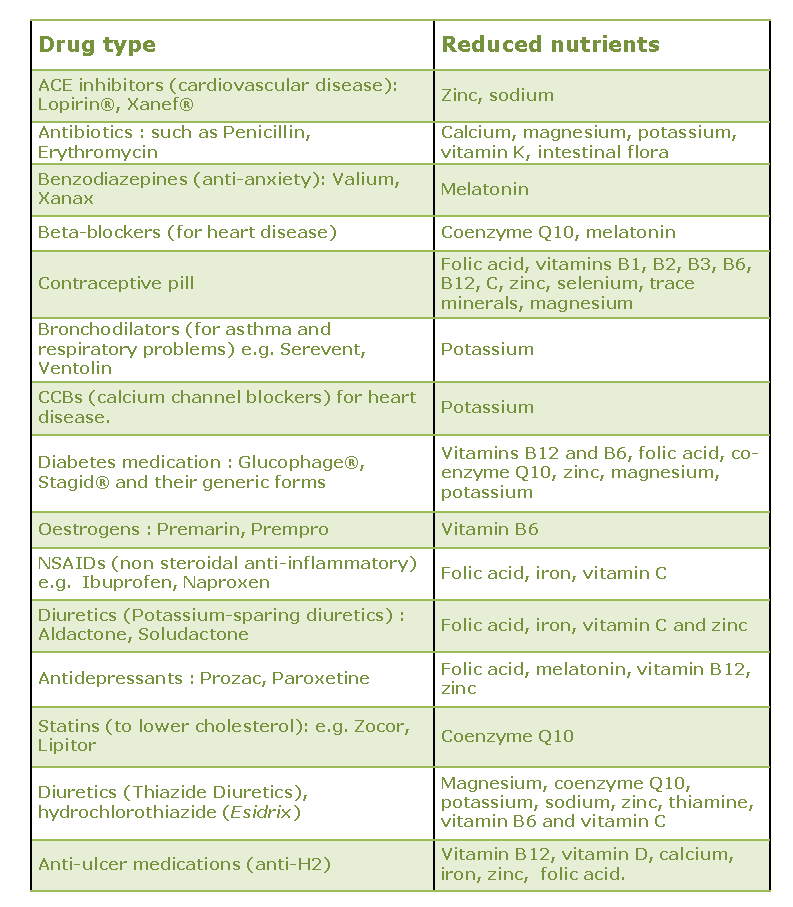|
LOSS OF ESSENTIAL NUTRIENTS
We have learned to be wary of the adverse effects of prescription drugs, but little attention is focused on the loss of essential nutrients that they cause. Many drugs are new molecules in nature which never existed until pharmaceutical laboratories invented them. When a person takes these new drugs, the body then has to metabolize them after which, as with any nutrient, evacuating the waste involves enzymes and chemical reactions using vitamins and minerals. Some drugs use large amounts of these vitamins and nutrients; this is why it is not surprising that drug taking, especially when it is long term, causes vitamin deficiencies. Even when the medication is a replica of a molecule naturally present in the body or in nature, it can increase the needs of the body for certain molecules. CONTRACEPTIVE PILL AND ANTIBIOTICS. When a woman takes oestrogen, regardless of the form (pill, hormone replacement therapy, natural or synthetic oestrogen), it depletes her body of magnesium and B vitamins,. Many antibiotics also reduce the reserves of magnesium which is a very important mineral that is involved in more than 300 chemical reactions in the body. It is a co-factor of adenosine triphosphate (ATP), which provides cellular energy, as do the B vitamins. Vitamin B6 is involved in approximately 130 reactions. If you are short of these B vitamins, it can cause anxiety, decrease libido, and reduce your levels of serotonin and melatonin. To compensate, you have to take all the vitamins of Group B, because they work together. For example, the body cannot use vitamin B6 if it lacks vitamin B2 nor can it use vitamin B3 if it lacks B6. Statins destroy reserves of CoQ10. |
CORTISONE AND ASPIRIN
Derivatives of cortisone such as prednisone and triamcinolone, used to treat many diseases, allergic, immunologic, inflammatory or cancerous, also reduce the reserves of calcium, magnesium, acid folate (vitamin B9), potassium, selenium, vitamin C and vitamin D. Yet, it is very rare that physicians warn their patients or prescribe dietary supplements for those who take these medications. Even a drug as commonly used as aspirin decreases the reserves of folic acid, iron, potassium, sodium and vitamin C. As for the pain killer paracetamol, it decreases the level of glutathione, an important antioxidant that protects cells from dangerous free radicals. STATINS AND OTHER DRUGS The widespread use of drugs such as statins (cholesterol reducing medications), is well known for reducing reserves of coenzyme Q10 (CoQ10), causing fatigue and muscle pain. CoQ10 is essential for the production of ATP from glucose in the mitochondria, the small "power plants" that produce energy in the cells. In order to provide good 'fuel' for the body, one needs not only nutritious food, but also adequate supplies of CoQ10 to counteract the effect of the drugs. SERIOUS RISK OF SIDE EFFECTS Dr. Mercola, in his on line newsletter of 26th October 2011 warns ‘there is a risk of side effects every time you take a prescription drug. No one (except for those who intentionally overdose) expects these medications to kill them, but they can do just that, and it happens far more often than you might think.... people should not assume there's no risk in prescribed medicines. The truth is, the only way to avoid all risk, including death, from prescription drugs is to not take them at all. It is YOUR body, not your doctor's and not your pharmacist's, so it is up to you to make the decision about what drugs to take, if any.’ |
|
DOCTORS HAVE A RESPONSIBILITY
Physicians should look more deeply to determine underlying causes before prescribing drugs to their patients. Drug-induced nutrient depletion is far more common than one would think. When evaluating a patient’s symptoms doctors should assess whether the symptoms are due to the illness, to the side effects of the drugs, or to drug-induced nutrient depletion. Considering the inadequate nutritional state of the majority of the population, the illness itself may be due, in part, to nutrient deficiency. Reference: Santé Nature Innovation (Natural Health Innovation) Further reading: www.westonaprice.org/health-topics/health-issues/your-body-on-drugs |
CONSIDER THE RISKS
Be sure you are aware of the risks of any medication prescribed to you, and weigh them up against any possible benefit, then you can make a well-informed decision. If you do decide to take a prescription drug, you should find out which nutrients may be depleted as a result so that you can keep your body nourished by either taking vitamin and mineral supplements or by eating foods rich in those depleted by the medication. |

